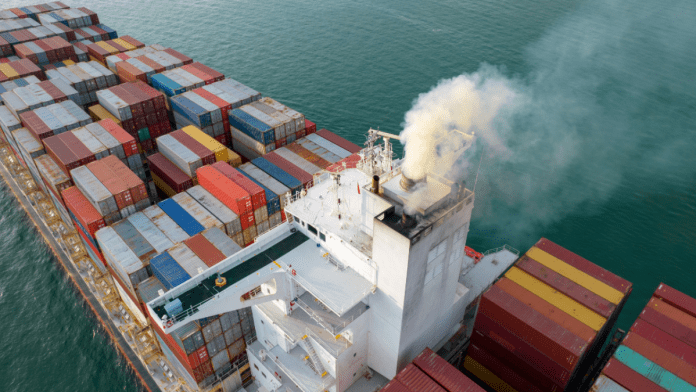🕒 Last updated on August 15, 2025
The United States has announced that it will strongly oppose a new plan by the International Maritime Organization (IMO) to cut greenhouse gas emissions from the global shipping industry.
US rejects global net zero shipping framework
In a joint statement from top government departments, the US declared it would not support the “Net-Zero Framework” and would take measures against countries that vote in favor of it.
The statement comes just weeks before an important vote in October at the United Nations’ shipping agency. The proposal seeks to make international shipping cleaner and reduce its contribution to climate change. However, US officials said the plan would raise costs for American citizens, shipping companies, energy providers, and the tourism industry.
The announcement is part of a broader approach where the US has been using tariffs and trade measures to influence decisions made by other countries. Officials warned that countries supporting the IMO’s net zero framework should “be on notice” and expect retaliation. They also said they would seek the backing of other IMO members to block the proposal.
The US is one of 176 member states of the IMO. The US had already walked out of discussions on the net zero plan earlier in April, urging other member states to withdraw their support. At that time, a majority of IMO members had voted in favor of the framework. China, Brazil, and most European Union countries were among the 63 nations that supported it, while only 16 nations opposed.
Details of the IMO vote and proposal
The International Maritime Organization establishes global shipping regulations. It aims to make ocean transport safer, cleaner, and more efficient. The net zero proposal is designed to bring down the greenhouse gases produced by ships, which currently make up about 3% of all carbon dioxide emissions worldwide. Ships carry around 80% of the world’s trade, so the sector plays a major role in global pollution.
In April, a simple majority of member states endorsed the IMO’s net zero strategy. But the October vote will have stricter requirements. For it to pass, two-thirds of the 108 countries that have signed the key legislation must agree. If all 176 members do not reach a consensus through discussion, the IMO will move to a formal vote.
📢 Political Earthquake — Wolff Says Trump Willing to Trade Ukraine for Silence on Epstein
Many large shipping companies have already pledged to reach net zero emissions by 2050. Industry groups representing these companies support the IMO’s move. Some have even called for a carbon levy—fees on polluting fuels like oil—to fund the switch to cleaner fuels.
Despite this, the US government says the proposal would unfairly burden its economy and industries. Officials believe it would raise the cost of shipping goods, increase fuel prices, and make products more expensive for consumers. They have made it clear they will act against countries that back the plan if it is adopted.
Wider climate and trade context
The US rejection of the IMO’s net zero framework is in line with its recent stance on global environmental rules. The administration has withdrawn from several international climate agreements, including the Paris Agreement, which aimed for net zero emissions by 2050. It has also pushed back against new restrictions that could limit the use of certain fuels or chemicals.
In addition to climate policies, the US is also currently involved in talks at the United Nations to create a global treaty on plastic pollution. In those talks, the US has warned it will not support any deal that sets strict caps on plastic waste or bans certain chemicals used in plastics.
The US has also been using tariffs as a tool in international negotiations, particularly with countries like China, India, and Brazil. Officials see these measures as a way to protect domestic industries while influencing other nations’ policy decisions.
For the shipping industry, the disagreement over the IMO proposal comes at a time of growing pressure from environmental groups and investors. These groups say that reducing ship emissions is vital for tackling climate change. Some have pushed for cleaner fuels such as green hydrogen, ammonia, and biofuels, which are less polluting but currently more expensive.
Shipping giants like Maersk and Wallenius Wilhelmsen are already investing in new vessels and technologies to meet their own net zero goals. However, without international rules, progress will vary widely between countries and companies. Industry supporters of the IMO plan argue that global rules are needed to ensure a level playing field and to prevent some countries from avoiding the costs of going green.
Tensions are expected to increase between the US and other IMO members as the October vote draws near. If the proposal passes, it could mark one of the most significant steps yet in regulating the shipping industry’s environmental impact. If it fails, the sector will continue relying on voluntary measures by companies and individual nations.

